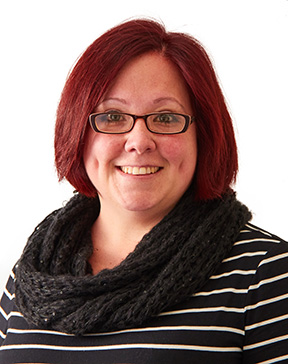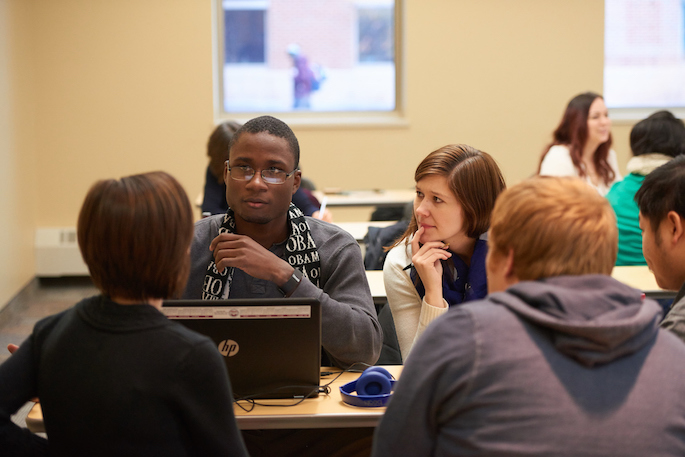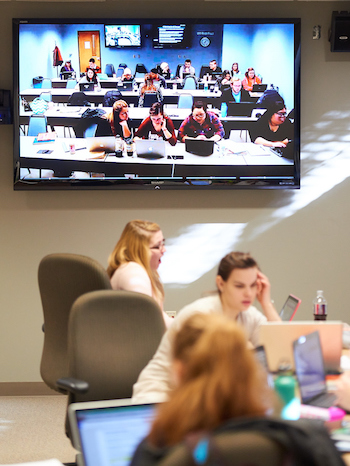Posted 3:27 p.m. Wednesday, July 19, 2017
Student Affairs Administration program earns high marks from bestcolleges.com.
Student Affairs Administration program earns high marks from bestcolleges.com
UW-La Crosse’s Student Affairs Administration program is one of the top five online master’s in higher education programs in the country, according to bestcolleges.com. Programs were ranked based on academic outcomes, affordability, and the breadth and depth of online learning opportunities. UWL’s Student Affairs Administration Department offers master’s and doctoral degrees in SAA — a field that prepares students to work in student affairs positions at colleges and universities. The program provides flexibility to students. Students can take the master’s program face-to-face or online — or a combination of the two, explains Jörg Vianden, associate professor of SAA and chair of the department. [caption id="attachment_49343" align="alignright" width="288"] Kathy Thoen, ’16, SAA program student, says she’ll graduate from the program in May 2019, the same time her oldest son graduates from high school. She likes that faculty in the program are approachable and responsive.[/caption]
That online flexibility was particularly important to SAA program student Kathy Thoen, who earned a bachelor’s degree from UWL in December 2016. A mother of three, Thoen started the SAA program in May.
“The fact that I can do it online works well with my life schedule,” she says. “I can do it when I’m available — after baseball games at 9 p.m. at night.”
Thoen has spent the last 20 years working in higher education. At UWL, she has worked for eight different UWL departments or programs in positions from academic department associate to a veterans certifying official. She wanted to continue for an SAA master’s degree because she enjoys interaction with college students. She wants to show them that college is attainable even in challenging situations. She completed her undergraduate degree at UWL while managing full-time work and raising her three boys. When she applied for the SAA program, she knew completing a master’s degree would likely be even more challenging.
“Coming into a graduate program later in life with so many things going on, you think, ‘Did I make the right decision?,’” she says. “But from day one, the encouragement from faculty helped me see that it is possible, and that we are all here for a reason.”
[caption id="attachment_49352" align="alignleft" width="685"]
Kathy Thoen, ’16, SAA program student, says she’ll graduate from the program in May 2019, the same time her oldest son graduates from high school. She likes that faculty in the program are approachable and responsive.[/caption]
That online flexibility was particularly important to SAA program student Kathy Thoen, who earned a bachelor’s degree from UWL in December 2016. A mother of three, Thoen started the SAA program in May.
“The fact that I can do it online works well with my life schedule,” she says. “I can do it when I’m available — after baseball games at 9 p.m. at night.”
Thoen has spent the last 20 years working in higher education. At UWL, she has worked for eight different UWL departments or programs in positions from academic department associate to a veterans certifying official. She wanted to continue for an SAA master’s degree because she enjoys interaction with college students. She wants to show them that college is attainable even in challenging situations. She completed her undergraduate degree at UWL while managing full-time work and raising her three boys. When she applied for the SAA program, she knew completing a master’s degree would likely be even more challenging.
“Coming into a graduate program later in life with so many things going on, you think, ‘Did I make the right decision?,’” she says. “But from day one, the encouragement from faculty helped me see that it is possible, and that we are all here for a reason.”
[caption id="attachment_49352" align="alignleft" width="685"] Students in a 2016 SAA program class. From left clockwise around the table, Charles Martin-Stanley II, facing camera; Megan Britt, now in UWL Residence Life; Meng Vang; Andrew Ives, now in UWL Student Life, and Maggie McConville.[/caption]
Students in a 2016 SAA program class. From left clockwise around the table, Charles Martin-Stanley II, facing camera; Megan Britt, now in UWL Residence Life; Meng Vang; Andrew Ives, now in UWL Student Life, and Maggie McConville.[/caption]
Work in higher ed while learning about it
The online SAA program participants like Thoen either work as full-time higher education professionals or in graduate assistantship-type positions. Thoen works full time — splitting her time as an ADA for both the Women’s, Gender, and Sexuality Studies Department and the Ethnic and Racial Studies Department. She says having the support of these campus offices has also been important. “Without their support, it would be hard to balance my job and home,” she says. SAA student Jessica Baran says the online program has allowed her to continue her professional role as an undergraduate services specialist in the Chemistry Department at UW-Madison, and, therefore, earn a steady income while in school. Many of the program’s online students are working in higher education full-time already, which means they can bring real-life examples into any conversation, says Tori Svoboda, assistant professor of SAA. Also, she and other faculty in the program can tailor assignments to fit with students’ professional experiences, she says. For example, online students in Svoboda’s classes have created:- conference program proposals that they later submitted and had accepted at regional and national conferences;
- grant proposals they later submitted and had approved for funding new programs or initiatives;
- personnel recruiting, training, and performance improvement plans they adopted in their hiring of student leaders;
- recordings of their work in action (advising, supervising, presenting, or facilitating), which is submitted for peer review and feedback;
- book club reading guides that were later used by their division of student affairs for the professional development for all employees for the year;
- training materials for academic advisors, resident assistants, and faculty advisors that were later adopted by their campus.
 A teleconference with students from UW-River Falls during the SAA blended online and on-campus program.[/caption]
A teleconference with students from UW-River Falls during the SAA blended online and on-campus program.[/caption]
